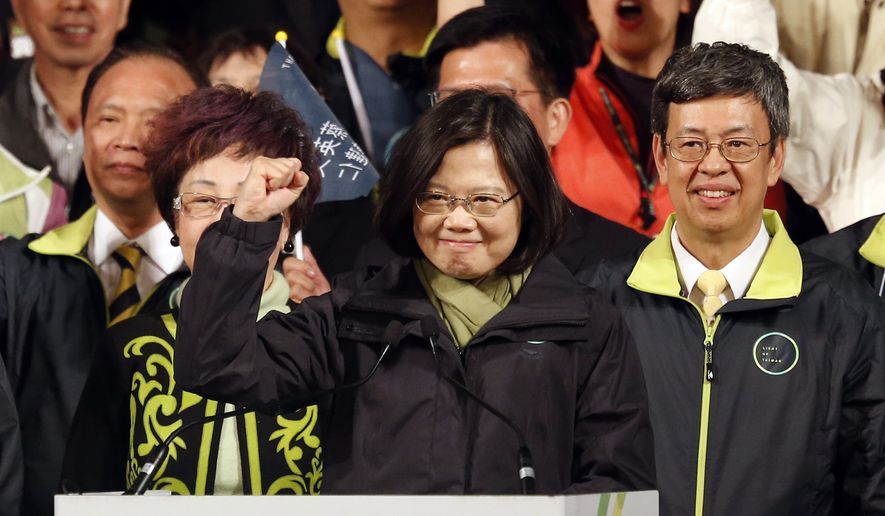OPINION:
The Republic of China (Taiwan) has become an economic powerhouse, the fifth largest in Asia and in the top 20 in the world, and even more important, its political institutions are stable. Real growth has averaged about 8 percent over the past three decades. The older labor-intensive industries have steadily moved elsewhere, replaced by technology-intensive industries.
But Taiwan is again more than an important trading partner for the United States ($65 billion in two-way trade in 2015. With mainland China threatening freedom of passage in the East China and South China Seas, Taiwan takes on greater strategic importance. Taiwan’s elections earlier this month held enormous implications not only for the island’s 25 million people, but for mainland China and the United States as well.
A stable and democratic Taiwan is essential to America’s Asian strategy. It must be high on the list for strengthening by the new president in 2017. The issue is pressing all the more given the Obama administration’s failing effort by former Secretary of State Hillary Clinton’s announced “pivot to Asia” to meet the growing threat of Chinese aggression.
After delay and stalling in the bowels of both the Bush and Obama administrations, the United States finally approved promised weapons for Taiwan, worth $1.8 billion, and accomplished over objections by the Communist government in Beijing. The package, to be delivered over several years’ time, includes two decommissioned U.S. Navy frigates, surface-to-air missiles, anti-tank missiles and amphibious assault vehicles. Important, but hardly adequate to deter a mainland military adventure.
The election of Tsai Ing-wen as president earlier this month restores a movement dedicated to protecting Taiwan’s separate Chinese culture. It was only a second time in 2,000 years that a Chinese government had peacefully transferred power.
The meeting last fall between President Xi Jing-ping and President Ma Ying-jeou was not only unprecedented, but finally marked the tacit recognition by the Communists that a democratic government in Taiwan is here to stay.
The new president’s victory speech was a ringing declaration for preservation of the status quo and a call on Beijing to avoid provocations. With slightly hunched shoulders, and shy for a public figure, the 59-year-old Ms. Tsai made it clear she and her Democratic Peoples Party, including many dedicated to declaring formal independence, would at the least oppose amalgamation with mainland China. That challenges the Communist claim that Taiwan is an integral part of “One China,” which Taiwan and mainland China leaders acknowledged to reduce tensions in 1992. China nevertheless refuses to renounce force in resolving disputes between the two countries.
The triumph of Ms. Tsai is in large part a reaction to the outgoing government’s economic agreements with the Beijing government and a movement toward some sort of political arrangement. A slump in the Taiwan economy and increased unemployment was part of it, too.
The previous government’s concessions to Beijing were a recognition of the growing economic ties between China and Taiwan. The economic relationship is a significant economic force for both Beijing and Taiwan. Two-way trade is well over $350 billion, with the transfer of technology and resident Taiwanese management an important element in China’s rapid economic growth. Only recently has Taiwan permitted mainland investment in its economy, including a $2.7 billion participation in Taiwan’s semiconductor industry.
Washington’s relationship to the Taiwan regime has fluctuated over the years. When Chiang Kai-shek fled to Taiwan in 1949 after the Communists defeated his Nationalist army, the United States endorsed Chiang’s effort to reconquer the mainland. During the Korean War more than 20,000 Communist soldiers defected to U.S.-led forces. In 1958, when Beijing threatened to invade Taiwan, the United States hinted that it might use nuclear weapons to prevent a Communist takeover of the island.
The Taiwan Relations Act of 1979 pledged the continued U.S. defense of Taiwan, including arming its military forces. This has kept the peace in Asia, fragile though it may be. Bickering continues, but as Winston Churchill said in quite another context, “jaw jaw” is nearly always better than “war war.”




Please read our comment policy before commenting.